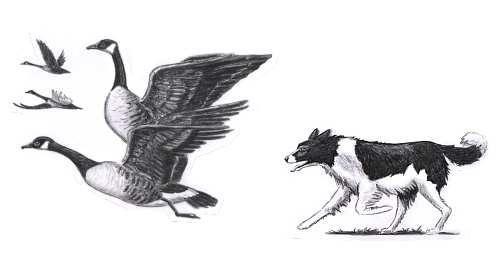
Dear Bird Folks,
A few weeks ago you told us why we suddenly have so many more Canada geese. I live on the Bass River and geese are often messing on our lawn. What is being done to control the goose population and what can I do to protect my property?
– Stan, Dennis
Hi Stan,
The goose poop is getting to you too, eh? You do realize that I kind of like birds, right? And when it comes to birds vs. lawns I’m probably going to side with the birds. However, since you were nice enough to write and for the sake of our lawn loving robins, I’ve researched what’s being done to save your lawn from those big mean geese.
The government, as usual, thinks we should shoot the problem away. They have opened up a September hunting season that targets resident geese. However, in September the weather is warm and there are still lots of people enjoying the outdoors. Goose hunters are reluctant to start shooting while wind surfers are zipping around the inlets and bays and families are out playing in the tidal pools. Hunters have enough public relation problems without causing a ten pound goose to drop out of the sky onto little Billy’s sand castle.
Many feel that the answer is not eliminating the adult geese, but in controlling their growing population. Communities around the country that are also dealing with extra geese have hired trained professionals who search out goose nests and then cover the newly laid eggs with vegetable oil. The oil prevents the eggs from developing. Simply removing or destroying the eggs is not effective as the geese often just re-nest. It is important to note that Canada geese are federally protected, so you can I can’t go running around trashing goose eggs without a permit and a clue as to what we are doing.
Another less aggressive method of goose control is to cut off their food supply. Just like capping the landfills have put a hit on the gull population, stopping the fun but problematic practice of feeding waterfowl, any waterfowl, will eventually knock back the goose population, especially if we have a series of hard winters. The suggestion of not feeding birds may sound funny coming from a guy who sells 404 tons of bird food a year, but it really is for the overall benefit of the geese. Plus, my sore back could use the rest.
All of the above suggestions will take years to have any noticeable effect, but there are things that can be done short term. Stop clear cutting to the water. Property owners, private or public, should encourage a barrier of vegetation to grow between a lawn (if you must have one) and any body of water. Geese like to walk right out of the water onto lawns. They often avoid tall grass. Short fences or lines of reflective tape have also been effective.
One very impressive method of goose control for larger areas, like golf courses and ball fields, is with the use of dogs. Not just wacky dogs that run around out of control, which may result with an injured goose or dog (geese are tough), but a well-trained dog. Those obsessive border collies are perfect. This week I read about a local woman who has started a business called “Coast is Clear” goose control. She and her robotic border collies are moving geese off many local playgrounds without the use of guns, horns or bad karma. Her dog “Bucket” simply herds the geese back into the water or into the next county, whichever is preferred.
So give Bucket a call, Stan, or better yet, get your own lawn guard dog. Just remember, by getting a dog you could be trading one kind of poop for another. Hey, it’s always something.